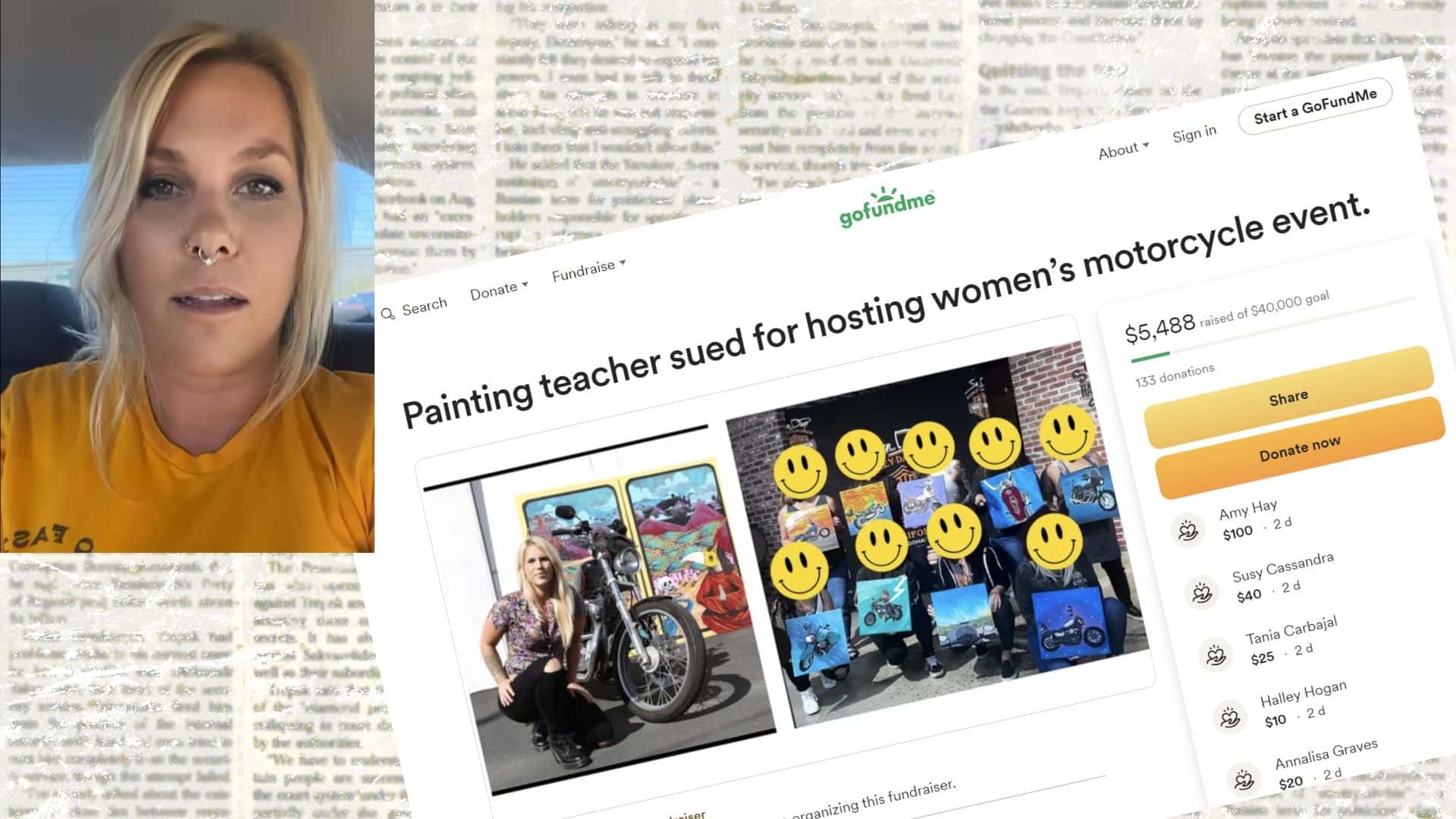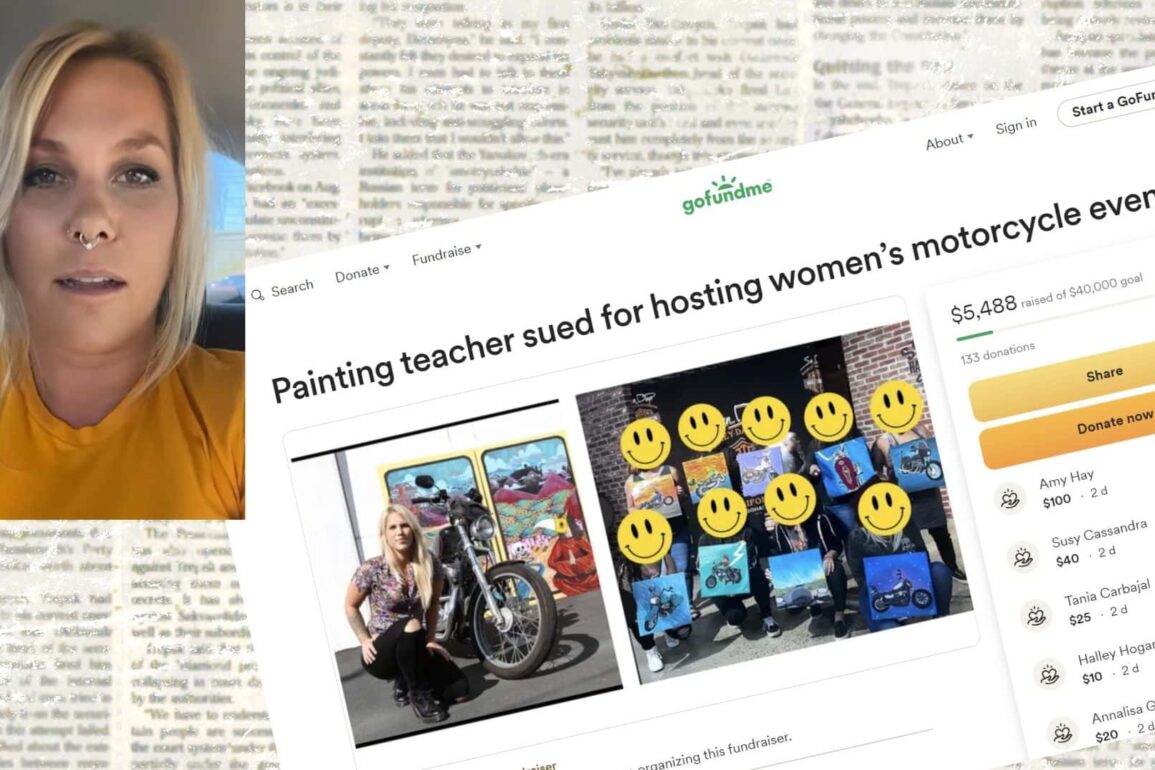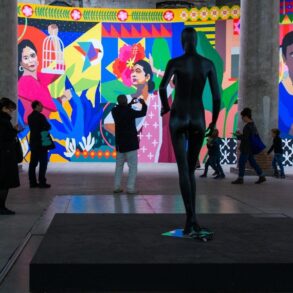
Sometimes, it feels like no good deed goes unpunished.
According to California-based art teacher Jackie “Danger” King, who’s also an avid motorcycle rider, how she came to combine both her art background and her desire to support other women who ride, came from her own experiences.
If you’re a fellow woman who rides, I’m sure you probably know how hard it can be to find other like-minded women in your area. The Internet has made it easier than ever for like-minded people to find each other, at least in the virtual space. But unfortunately, it’s not always that easy to meet and interact in person. So, if you want to spend time bonding in the real world, it can be more difficult depending on your geography.
That’s why Danger says she was excited at the prospect of teaching a women’s motorcycle painting class, in association with a local women’s riding group in her area. With the support of local Harley-Davidson dealerships, which are also named as defendants in the lawsuit recently filed against Danger for having the audacity to host such an event [yes, my phrasing is sarcastic here], she viewed her mission as helping to bring women together and strengthen the bonds of riding sisterhood in a traditionally male-dominated niche.
Danger, like plenty of other women across multiple industries, wanted to create a safe space for women. But as she tells it, she was served with a stack of lawsuit paperwork in March 2024, alleging discrimination and violations of California’s Unruh Civil Rights Act.
Very plainly, it sucks. It’s infuriating. And it’s only the tiniest bit of comfort (for various values of that word) to know that Danger is far from the only woman or women’s empowerment organization to be sued by men who allege discrimination based on Unruh.
So What Is The Unruh Civil Rights Act?
It’s a California state statute that first went into effect in 1959. It’s been amended over the years, including in the 2000s, to add language regarding discrimination based on sexual orientation.
“The Unruh Civil Rights Act (California Civil Code Section 51) provides protection from discrimination by all business establishments in California, including housing and public accommodations, because of age, ancestry, color, disability, national origin, race, religion, sex and sexual orientation,” is how California’s Department of Rehabilitation, Employment, Independence, and Equality defines Unruh.
For fair-minded folks of all identities, that sounds pretty good, right? Leveling the playing field to avoid discrimination against various groups of people is a worthy and admirable goal, no doubt.
Unfortunately, in practice, the broad terms used in defining this well-meaning civil code have seemingly been weaponized against the very groups Unruh was meant to protect. And even worse, it’s been going on for over 20 years at the time of writing.
Weaponizing Unruh
You don’t have to search very hard to find multiple reports of men claiming gender discrimination in lawsuits under California’s Unruh Act, as well as some related to the Gender Tax Repeal Act.
This includes reporting from both national and California-based news outlets, as well as legal analyses by law firms like Steptoe and the legal scholarly journal, University of Chicago Legal Forum. At least 100 of these suits (and possibly more, depending on which source you read) stem from one lawyer representing multiple plaintiffs in cases claiming injury under Unruh. This lawyer was also incidentally a board member of the National Coalition for Men.
Coincidence? Unlikely.
A Slate piece from 2016 noted that this lawyer “once won a $510,000 settlement in a sex-discrimination suit against the Oakland A’s, which [he] claimed violated Unruh by giving out free hats to women on Mother’s Day.”
Writing about this trend in 2016, Mother Jones called it a “strategy,” and wrote that “critics in legal circles contend that these lawsuits appear to be as much about making an easy buck as they are about defending aggrieved men.”
How is it about making an easy buck? Because the defendants in these cases often end up settling out of court rather than vigorously defending their cases.
Lawsuits are expensive, and California has the added wrinkle of requiring defendants who lose civil cases (which all these cases are) to pay all the court costs of the winning plaintiffs.
You can see how this can all stack up to a whole lot of money in out-of-court settlements.
Or, as the lawyer representing the women’s empowerment networking organization Ladies Get Paid as a defendant against an Unruh suit said, “if you are a young company, you are not going to test the merits. You are going to wind up paying for the plaintiff to go away.”
In an article on the matter for the University of Chicago Legal Forum, Anna Porter wrote, “A California appeals court similarly raised concerns about the potential for abusive litigation in Cohn v. Corinthian Colleges, Inc. The court expressed a distaste for the repeat-player plaintiffs in the case, who it viewed as being involved in shake-down lawsuits.”
Elsewhere in her piece, Porter wrote about a similar suit filed against Los Angeles-based craft beer company Eagle Rock Brewery, which was sued over its monthly Women’s Beer Forum. Men were allowed to attend the event, but the stated intention was to encourage more women to attend since women have historically been underrepresented in the craft beer space.
When a man was mistakenly told that it was a women’s only event, he filed a claim with the California Department of Fair Employment and Housing over the matter, and Eagle Rock Brewery later settled the matter out of court. The owner later said she regretted settling, and added that she hopes to “elicit some form of change at the legislative level to minimize the exploitation of the Unruh Act by career plaintiffs.”
So What About Jackie Danger’s Motorcycle Painting Classes For Women?
Danger continues to raise both awareness and funds to fight her impending legal battle via her Instagram and the GoFundMe she’s set up to fight. Since going public about this lawsuit, she’s spoken to other women in SoCal who are facing similar lawsuits, and has come to the conclusion that these men are purposely seeking out women small business owners to file these complaints against.
If you are a 21st century Elle Woods, or you know a 21st century Elle Woods or similar amazing legal representation who can help, Danger would probably appreciate hearing from you on her IG.




